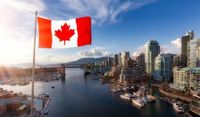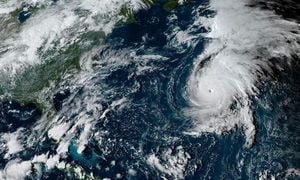In 2025, diplomatic relations between Canada and the United States are showcasing a notable deterioration, prompting discussions about a potential realignment of international alliances. Under the leadership of Prime Minister Mark Carney, Canada's approach appears to pivot significantly towards Europe, specifically strengthening ties with France and the UK amidst a backdrop of economic tensions with its southern neighbor.
Following his inauguration, Prime Minister Carney made headlines with his first official visit not to Washington, D.C., but to Paris, where he met with French President Emmanuel Macron on March 17, 2025. During their meeting, they discussed economic and defense collaborations, including a partnership on critical minerals and clean energy. The two leaders also emphasized their commitment to supporting Ukraine, which is particularly significant given the large Ukrainian diaspora in Canada. Macron described Canada as "an integral part of the Canadian identity" and underscored the historical and cultural ties between the two nations.
However, Carney's embrace of France signals a shift that contrasts sharply with former U.S. President Donald Trump's longstanding ambition to fold Canada into the U.S. as the 51st state. Such sentiments harken back to the early 19th century during the Anglo-American War, when American expansionism threatened Canadian sovereignty. In fact, the dissolution of traditional partnerships is gaining momentum as Canada actively looks to reinforce its identity and partnerships away from U.S. influence.
On the same day of his meeting with Macron, Carney also visited the UK, where he met with King Charles III and British Prime Minister Keir Starmer. The king's choice of a red tie - an allusion to the Canadian flag - symbolically reinforced his stance against any move to assimilate Canada fully into the U.S. structure. There, Carney and Starmer deliberated on economic cooperation and transatlantic security issues, further signifying the emergence of an Ottawa-London axis that may challenge previous U.S.-centric policies.
The importance of Carney's diplomatic outreach becomes clearer when considering the economic context. Over the years, Canada has diversified its trade relationships significantly, now listing France as its third-largest trading partner in the EU, amounting to over $14 billion. Furthermore, the Comprehensive Economic and Trade Agreement signed between Canada and the EU in 2016 emphasizes the necessity for strategic partnerships outside the U.S. sphere of influence.
Simultaneously, the waters between Canada and the U.S. have been turbulent. Not only has Carney signaled a commitment to work with U.S. allies, but the U.S. has also implemented border policies that complicate access for Canadians. An example is the renowned Haskell Free Library & Opera House that lies across the border in Vermont and Québec, which recently faced new restrictions enforced by U.S. customs officials. Traditionally a symbol of U.S.-Canadian camaraderie, visitors from Canada now must display their library card upon entry as of October 1, 2025. This not only alters the practical implications of cross-border access but also stands as a metaphor for the evolving dynamics in North American relations.
The new regulations at the library were prompted by a need observed by U.S. authorities to address perceived vulnerabilities to drug trafficking and smuggling. The Department of Homeland Security stated this decision reflects a need to "end exploitation by criminals and protect Americans." As such, the favoring of stricter access also plays into the Trump administration's broader tough-on-immigration stance that aims to scrutinize individuals even when crossing a symbolic library threshold.
In response to these new regulations, more than CAD 140,000 has been raised to renovate the Canadian side of the library, prioritizing accessibility and ensuring that Canadian patrons can engage freely with the library's offerings, despite the tightening restrictions. Local fundraising efforts for a new entrance highlight the community's commitment to maintaining this cross-border unity.
In parallel with library access struggles, U.S. embassies in Europe are issuing social media warnings regarding visa holders engaging in activities deemed objectionable by the U.S. government, including protests related to political conflicts. U.S. embassy posts across at least 17 countries highlight strict repercussions for visitors who engage in behavior contrary to American interests. According to State Department spokeswoman Tammy Bruce, the warning is positioned within a reasonable framework for maintaining national security. She reiterated, "Follow the law, behave yourselves, be a good visitor and you’ll be fine."
Such moves to restrict access for Canadian patrons and codify visitor behavior reflect a climate of heightened scrutiny that intersects with historical tensions and economic uncertainties. As both international and domestic landscapes shift, the implications for U.S.-Canada relations remain ambiguous.
As an emerging figure in this charged political atmosphere, Carney faces the daunting task of navigating these waters, weighed down by historical connections and contemporary challenges. The contradictions in the Western coalition are becoming increasingly evident, with Canada finding itself juggling relationships that straddle multiple political interests. While Canada seeks stronger ties with European allies, the specter of U.S. discontent looms large, particularly as it perceives shifts away from its influence.
The simultaneous trajectory of strengthening UK and EU ties while managing a fragile relationship with the U.S. provides an intriguing lens through which to view Canadian national interests in 2025. Challenges brought about by border policy alterations, economic pressures, and burgeoning international expectations all suggest that the complex interplay between Canada and its political neighbors will continue to evolve.







